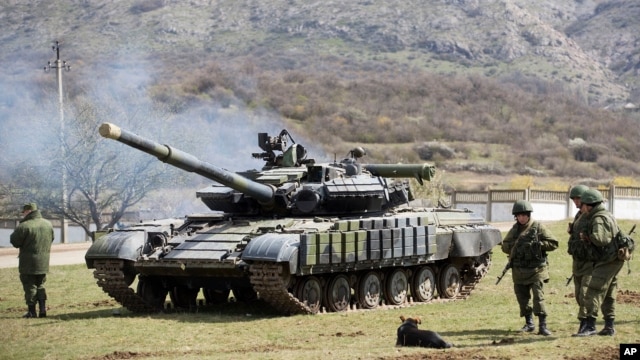As The World Turns
"The rupture is due to the West's refusal to end the Cold War de facto or de jure in the quarter-century since the collapse of the Soviet Union. In that time, the West has consistently sought to expand its zone of military, economic and political influence through NATO and the EU. Russian interests and objections were flatly ignored. Russia was treated like a defeated power, though we did not see ourselves as defeated. A softer version of the Treaty of Versailles was imposed on the country. There was no outright annexation of territory or formal reparations like Germany faced after [the First world War], but Russia was told in no uncertain terms that it would play a modest role in the world. This policy was bound to engender a form of Weimar syndrome in a great nation whose dignity and interests had been trampled."
Sergei Karaganov, Russian foreign policy expert, Higher School of Economics, Moscow, Izvestia
Russian soldiers stand near a tank at a former Ukrainian military base in Perevalne, outside Simferopol, Crimea, March 27, 2014
With the fall of the Berlin Wall separating Germany into east/west alliances, the dissolution of the union was fated and agonizingly crumbled with Soviet satellites scrambling in their haste to secede from the Union of Soviet Socialist Republics to become fully autonomous, recovering their national pride along with the accompanying need to be accountable to their own futures. A future they recognized in alliance with the West, in rejection of Russia's domination.
It was a rejection that Russia reeled under, its self-esteem mortally wounded, and seeking a self-exculpating enemy to blame for its misfortune. It really didn't have to look very far; the economic union of the Soviets was a disaster; the very ethos of collectivism requiring self-sacrifice for the greater good of the community works well for bees and for ants, but not for human beings whom nature constructed with entirely different social genetic traits. Reward to those who deserved it by the sweat of their brows, not to those who luxuriated on the efforts of others.
Russia thought that despite its resentment against the west and particularly the United States, it could solve its economic woes by embracing capitalism, but corruption was too deeply engrained in the public and institutional spirit of the nation for their new enterprise to succeed. And the path to self sufficiency in an economy with a manufacturing base that was devoid of both enterprise, the entrepreunerial spirit and self-respect in the production of excellence failed the country.
But energy resources saved it. And enabled it to regain some of its swagger and self-reliance. Russia could never accept the reality that the world had changed from hosting two super-powers at variance with one another, to only one, and it was not that one. State-sponsored subsidies that died with the Soviet union left some Russians nostalgic for the past, and among them was an KGB officer who would become president. This, at a time when the gulag became a nasty memory of totalitarian rule.
Russia did not fully appreciate the kindly disposition of those whom it once derided and threeatened, who now invited it into joining the globe's leading industrialized countries, and its invitation into the NATO-Russia council. What it was intent on doing was to itself emulate the European Union, to forge another alliance with its former satellites. Unfortunately, the yearning to reforge that alliance was clear from the Russian side, absent from its former allies.
Resentment builds upon unrequited intentions. Particularly once the former Soviet vassal sates made it clear their interests were in becoming part of the European Union and NATO. When Russia cried a heartrending foul! no one seemed particularly interested, so instead of pouting it marched into Georgia and then lent support to Serbia and from there quietly led Ukraine into rebellion against itself, annexing bits here and there to inflate greater Russia.
And it threw a party to demonstrate just how much it didn't care about what the world thought of it defending, encouraging and supporting countries like Iran, Syria and North Korea. The world could criticize Russia, but it had a permanent seat on the United Nations Security Council and had the undeniable ability to vetoe anything that didn't suit it, including sanctions against murderous states. Russia would champion the outliers of global society and make its mark there, if nowhere else.
The corruption, alcoholism, economic failures, demographic decline, attack against freedom of the press, democratic wobbling, an oligarch-led economy, and warped judiciary has returned Russia to more than memories of the past. Despite which Vladimir Putin has revealed a new belligerence on a larger scale challenging the primacy of the United States whose president is more than amenable to following his lead in watching the Middle East implode with the help of international diplomacy.
And now Vladimir Putin is leading the Kremlin in a war with the European Union, and with NATO. Neither of which really is all that terribly enthusiastic about engaging in violent conflict, since each was instituted to deflect just that.
Labels: Communism, Democracy, European Union, NATO, Russia, United States


<< Home